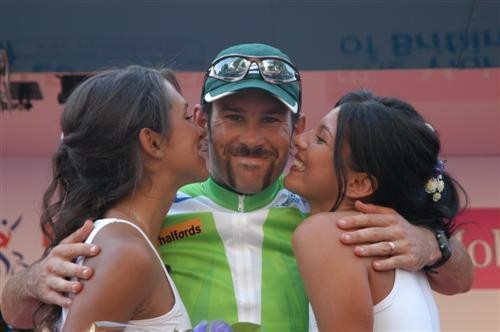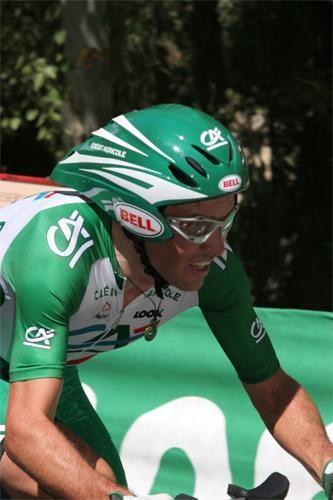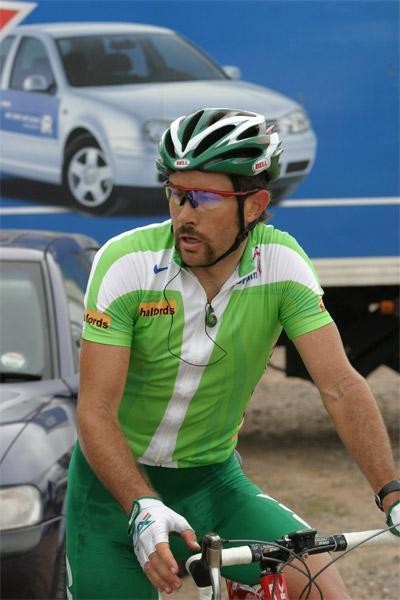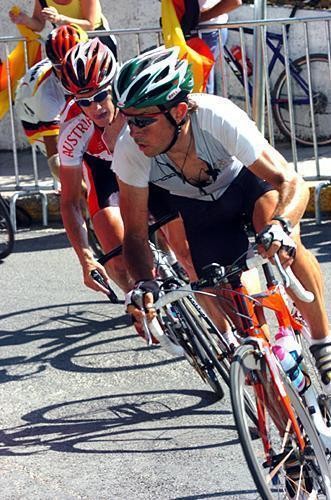The kiwi journeyman
The last time Cyclingnews spoke with Julian Dean, he was hoping for a Tour de France stage or major...




An interview with Julian Dean, November 30, 2005
The last time Cyclingnews spoke with Julian Dean, he was hoping for a Tour de France stage or major classic win. While this has proven elusive thus far, New Zealand's top road cyclist has confirmed his reputation as one of the most reliable and talented sprint lead-out men around. From humble beginnings as a professional in the US to racing for Lance and George on US Postal before a successful 2003 with CSC, Dean now races with Thor Hushovd and Jan Kirsipuu on French Pro Tour team Credit Agricole. Cyclingnews' John Lieswyn spoke with Dean in New Zealand to get his take on the year and what the future may hold.
Injury forced Dean off the bike for two months this season, but the rehabilitation wasn't his only challenge; wife Carole gave birth to their son, Tanner, and singlehandedly managed the heavy demands of a newborn so Daddy Dean could train before his return to competition. During his first major race back, the Vuelta a Espana, it didn't take long for Dean to be right back in the thick of the sprint action. With the Madrid world championships as Dean's primary goal, becoming ill during the Vuelta meant withdrawing part way through the race, but it was mission accomplished as far as building strength and confidence was concerned.
Dean knew who to watch and made the winning break in Madrid. Rather than getting caught and sprinting against McEwen and Petacchi, our determined Kiwi burned a lot of energy while some of the other favourites watched each other. Coming up ninth at the end may have been disappointing for Dean but was further confirmation he was back at the top. With abundant form he wrapped up the year with a largely unsupported seventh at Paris-Tours.
CN: I'm sure it's good to be home...what have you been up to?
JD: I've had a few days here and there surfing. It's been good to catch up with family and friends; having a newborn means everyone wants to see Tanner.
CN: How is being on a French team after US Postal and CSC?
Get The Leadout Newsletter
The latest race content, interviews, features, reviews and expert buying guides, direct to your inbox!
JD: Moving to a French team was a good step for my career. On Postal it was difficult to move up in the team, which was really based on the grand tours classifications. I took a lot of what I learned about tactics, preparation, and scientific training to Credit Agricole.
CN: It's good to see you back on the front delivering Thor to Petacchi's wheel and still getting some impressive results this season - will you get more opportunities and team support in 2006?
JD: Thor is thankful for the support and makes sure I'm taken care of within the team. Thor has really gotten so much better in the last two years. The TdF Green Jersey will be a focus for him, I hope to be there for him. There will be other races where we are not together, so when I have the capacity and confidence I'd like to be able to say to the team I need the support.
CN: What is Thor like?
JD: In the last Tour de France I did with him, Thor knew he wasn't as fast as Robbie so he got in breaks and rode very aggressively. Thor is such a competitive character; he's confident and doesn't let anyone get it his way.
CN: This sounds a lot like your style too!
JD: Especially in America I never thought twice about going in breakaways. Despite being known as a sprinter, I won as many races from breaks as I did from the front of a leadout train!
CN: How long did it take to adapt to European racing?
JD: Only in the last couple of years have I learnt how to get through the big mountains in Grand Tours. I was always afraid of making the time cut. Now having done a few I have a better understanding of how to save energy for the stages that suit me. For one day racing, I learned a lot from being on Postal...Lance was the expert at planning and preparation!
CN: How would you characterise your time in North America?
JD: When I went to the US, Europe wasn't my ambition. For enjoyment and ease of life my best years of cycling were when I was in the US. Perhaps I would have had faster career development, done more Tours, had I gone straight to Europe. As far as personal development the US was good. Who is to say that at age 20 I wouldn't have just hated it (in Europe).
CN: How about the Tour de Georgia or Tour of California, could one of them be on your 2006 schedule?
JD: I haven't spoken to the team about whether we'll be there, but if we go, then I'll be a volunteer for sure. I always enjoy racing in the States.
CN: What do you think of the Pro Tour?
JD: The good thing is that there is initiative to improve. For generations the sport hadn't developed, and it had fallen behind other modern sports. But whenever there are major changes, there will be problems. Riders and managers are complaining but time must be given to adapt. As it is now, teams classement having so many points means that some managers put having 16th, 17th, 18th ahead of having a single rider in the top 5. For example, Robbie McEwen might not be in the top 100, and this detracts a little from the nature of the sport.
CN: How do you think races like the Herald-Sun Tour and Tour of Langkawi can maintain momentum with the new Pro Tour?
JD: Riders will want to race these races because they're good quality. Two or three big teams will therefore attend even if the race never gets all the big teams. If the race goes it can't necessarily be blamed on the Pro Tour. The bottom line is that the Tour de Langkawi won't be around forever. Races come and go, and it always comes down to money; how much prizemoney and start money is offered.
CN: You mention something called 'sprinting senses' to describe a fearless mental state. How does one go about developing sprinting senses? Is it experience or just an ingrained ability that sprinters have?
JD: A large part is in your natural ability, but it also comes from having confidence in yourself. When you are trying to find it, it may not come...it's more from having the confidence in your capacity to race at that level.
CN: Your diary descriptions make the job of a sprinter sound harrowing. I raced primarily in the US, but you've done both circuits. What is it about the European peloton versus the North American riders that makes a crazy route relatively safer to negotiate?
JD: When you are coming to the finish, the speed is so high that it stays single file. You don't get groups of riders trying to move up all trying to be at the front. You must be attentive and know when to make a move to the front; you have one shot and it must be timed correctly.
CN: What are your main targets for 2006?
JD: I can't realistically think about Amstel Gold or Liege, but I have the capacity for some of the classics. After that, being on a French team means that the Tour is hugely important so my first goal will be to get to the Tour. I haven't looked at next year's World's course yet but I'm sure that will also be a goal.
CN: Do you have an idea when you will stop racing professionally?
JD: I'm asked this often. Not too much of an idea on this, but I only have one more year on my contract. I'd like to be at Beijing (in 2008) so we'll see, take it one year at a time.'
CN: With your end-of-season good form, why wouldn't you do a few NZ local races for fun? Do Pro Tour team directors prohibit their riders from such extra-curricular racing in the interests of safety or recovery for 2006?
JD: The bosses wouldn't mind if I did them, but I haven't the desire to be away from home and family at this time. I have to save my mental cards for the season!
CN: One of your early mentors used to say, 'It's just a bloody bike race'. Do you have any quotes for us?
JD: 'The best performances come from the biggest setbacks'.